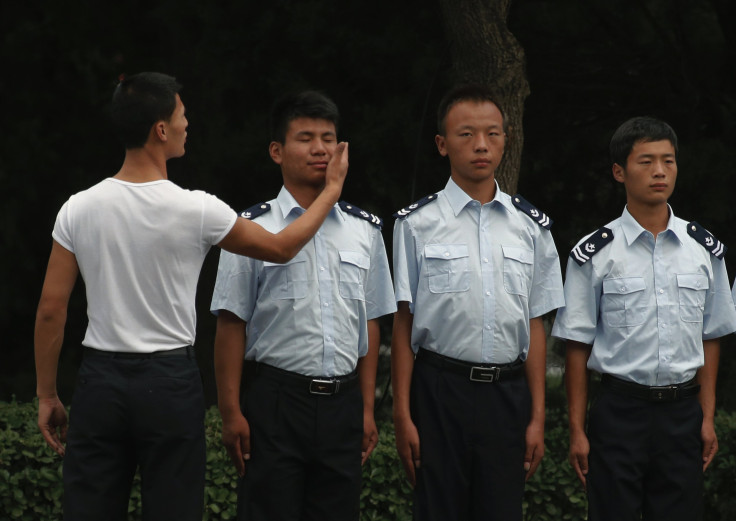What’s In A Slap? It Depends On The Culture, The Participants And The Intent

A local government minister in India has deemed that slapping a lazy civil servant in public is acceptable.
"Sometimes officials do not do any work properly and do not listen, too," Dayanand Mandrekar, civil supplies minister in the western state of Goa, said during a legislative assembly budget session. "Then … they should be slapped.”
Mandrekar echoed an earlier comment made by fellow legislator Mickky Pacheco, who complained officials of the water resources department didn't do any work on the construction of a retaining wall in a nearby village until they were slapped in the face by townspeople, the Indo-Asian News Service reports.
Pacheco has already been convicted on charges of slapping a government official, though he's appealing the sentence.
In India, slapping is a familiar custom, although it's typically confined to the home when parents seek to punish their children, or when young women defend themselves from unwanted sexual advances. In these cases, charges aren't usually filed, nor are they taken seriously by the police.
When an adult male slaps another adult male in India -- as in the case of Pacheco and the bureaucrat -- it's considered a grave affront to a man's honor.
Meanwhile, in the U.S., slapping is considered a misdemeanor and can carry up to a one-year prison sentence.
Last month, a husband in the tech-hub city of Bangalore slapped his wife so hard that she died from her injuries.
Dharmesh Kumar, a 38-year-old researcher at a multinational company, was arrested on murder charges. Dharmesh said he hit his wife, Mahalakshmi, 37, in a fit of rage during a domestic argument.
In recent years, perhaps one of the most high-profile incidents in India occurred when an irate Delhi businessman named Harvinder Singh slapped the Agriculture Minister Sharad Pawar during a public literary event.
“They are all thieves,” Singh yelled, according to reports. “I will rip them apart.”
Singh, who was arrested on assault charges following the November 2011 incident, apparently was angry over rising prices and political corruption; however, such frustration among the Indian public has wide support.
“The reality is, people on the street welcome this,” Abeer Vajpayee, founder of a small media production company, said in an article published in the Los Angeles Times.
“In India, the general perception is that all leaders are corrupt, and you need to elect the least corrupt out of the bunch of thieves.”
Slapping can occur in other forms of conflict as well.
In February of this year, the top police official in Mumbai said that he wished more ordinary citizens would slap suspected criminals to help maintain law and order.
Mumbai Police Commissioner Satyapal Singh told a function on women's safety, "How could we nab a culprit?"
"We don't have the right to slap them," Singh said, according to NDTV News. "When we do that, it's called a human rights violation. We can't do it, but you can ... You could slap them and we will bring the culprits to book."
The “legitimacy” and application of slapping can vary from culture to culture.
For example, in August 2011, an Italian politician was arrested by Swedish police after he slapped his son on a public street outside a restaurant in Stockholm while on vacation.
Apparently, either the 12-year-old boy didn't want to enter the restaurant or disagreed over the choice of the meal, which angered his father.
“I held my son by the collar of his jacket and his hair for a moment,” Giovanni Colasante, a 46-year-old politician from Canosa di Puglia in southern Italy, told a Stockholm court, according to the Expressen newspaper.
Colasante was arrested after eyewitnesses called police and notified them of his behavior. Colasante had broken Sweden’s sacrosanct laws on corporal punishment.
In 1979, Sweden became the first country to outlaw corporal punishment and has zero tolerance for any physical abuse of children.
“The father fought with [his son], absolutely and with a certain emphasis, and likely gesticulated like we usually do,” Colasante's lawyer, Giovanni Patruno, told Italian newspaper La Stampa.
Åke Malm, the Rome correspondent for Aftonbladet, the Swedish newspaper, said the case received much media coverage in Italy.
“Here in Italy, it's being portrayed like it wasn't anything serious, that it was just a little slap,” he said.
“Some think it's an abuse by the Swedish authorities to get involved in a simple family dispute. But many also say that it's good that there is now a serious debate about corporal punishment.”
On an Italian morning chat-show, attorney Patruno noted that Swedes and Italians have a “different way of looking at things.”
“For us Italians, a slap can be a way to teach a child a lesson,” Patruno said.
Colasante was convicted, spent three nights in jail, and then returned to Italy. The Swedish court waived a $1,000 fine, noting that the boy didn't sustain any injuries.
© Copyright IBTimes 2024. All rights reserved.











